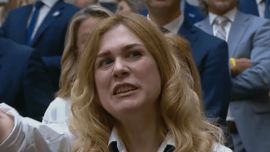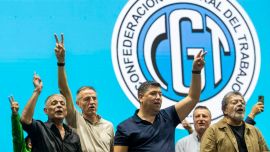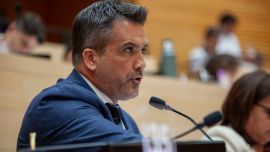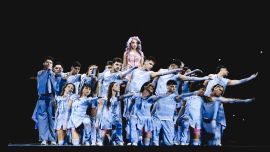Is it possible to govern this Argentina in an efficient manner? The question pertains specifically to the current socio-political-economic setup and the ways in which interests and capacities interact – at the end of the day, the question regards power relations and organisational theory, which means that concepts must be analysed within their real-life applications and their consequences. Unfortunately, looking at it from this standpoint, it seems increasingly clear that the Argentine democratic model has failed, and that it will remain as such unless there is an absolute reset of the system, which seems unlikely anytime soon.
This morning, President Alberto Fernández and Buenos Aires City Mayor Horacio Rodríguez Larreta are due to meet at the presidential residence in Olivos to discuss the next steps in the battle against the coronavirus pandemic, as Covid-19 cases surge aggressively. The face-to-face meeting will be their first in a long time, after a successful spell of cooperation during the early stages of the pandemic along with Buenos Aires Province Governor Axel Kicillof, consolidating a triumvirate that gained popular support, with approval ratings skyrocketing for the three as a result. Yet once fear over the uncertainty globally presented by the Covid-19 pandemic receded, the Argentine political class returned to its usual fandangles, generating conflicts that were publicly aired before they were communicated to intended rivals in order to both please their supporters and irk their competitors.
That ‘The Fear’ has receded does not lead to an automatic reduction in uncertainty. Fear, like odour, becomes more tolerable the more we are exposed to it. But danger, unlike odour, doesn’t necessarily become more digestible, as it has the capacity to inflict real pain. At this juncture, amid uncertainty over the future evolution of the Covid-19 surge, we know its damage-inflicting capacities, expressed through the saturation of health systems that leads to unnecessary loss of life, as the Italian city of Bergamo first proved to the world. In neighbouring Brazil we are currently seeing an exponential surge in Covid-19 deaths, consolidating a trend above 3,000 daily deceased, with cases having recently broken the 100,000-mark. It is not just the Amazonian capital of Manaus, but also the economic power-centre of Sao Paulo that is experiencing oxygen shortages, forcing cemeteries to work overnight to deal with demand.
It isn’t clear how much of this is President Jair Bolsonaro’s responsibility, despite his repeated mockery of the pandemic and public appearances violating all sorts of sanitary norms. Yet there seems to be some correlation between leaders that downplayed the severity of the pandemic and the slope of the curves for cases and deaths. Look no further than the United States, where Donald Trump publicly ridiculed Joe Biden for wearing “the biggest mask I have ever seen,” despite privately acknowledging the dangers of Covid-19, as Watergate reporter Bob Woodward revealed. While Trump must be praised for his insistence on having the vaccine before the end of 2020 – which he was criticised for and actually delivered on – Biden’s mask-mandate and other sanitary measures have helped to curb the spiralling pandemic in the US. And the vaccines don’t hurt. Some analysts believe every major city in the US will be open for business by the end of May.
Back to Argentina, where President Fernández’s early and efficient reaction to the pandemic, in tandem with the aforementioned triumvirate, initially gained public support and proved effective. While the strict quarantine period seems to have extended longer than needed, having government and oppositions working shoulder-to-shoulder did have a positive impact for as long as it lasted. It also created hope that moving forward, there was a rational way to resolve problems that didn’t involve the friend-enemy dichotomy which results in pushing parties toward the extremes.
The Fear does seem to be a catalyst for cooperation, but it is also irrational in that it is more evident when consequences are in the short term. The lack of a coherent plan between government and opposition in the 37 years since the return of democracy has resulted in, for example, a 42 percent poverty rate, as the INDEC national statistics bureau revealed this week. More alarming, and unjust, 57.7 percent of children under the age of 14 live in poverty. Former president Mauricio Macri was right in setting his top priority as “zero poverty” despite failing miserably at achieving it. But Macri, like the Kirchners before him and the Fernández-Fernández administration succeeding him, never found a way to build a lasting working relationship with his political opposition.
Maybe, though, the problem is the system. In recent days there’s been a back and forth between government and opposition regarding access to vaccines, with President Fernández joking that if “they have such a good relationship with the world, they should help me get more vaccines.” Both Fernández and the opposition know that in the midst of a global vaccines race, some 10 percent of the world’s richest countries concentrate 90 percent of doses yet they continue to use the issue to berate each other publicly. This, experts in the Casa Rosada confirm, is the consequence of being in an electoral year, which occurs every other year in Argentina. Asked whether there was an actual will to cooperate ahead of today’s meeting between Fernández and Rodríguez Larreta, Reperfilar’s Casa Rosada reporter Alejandro Gomel shrugged, noting: “It’s the campaign.”
Democracies across the globe generate opposing political forces that entrench themselves in an irrational and purely emotional power struggle, despite underlying ideological differences. Democracies, as opposed to autocracies, are supposed to thrive on pluralism and differences, but only inasmuch as these do not become irreconcilable. Yet, when polarisation and emotional entrenchment reaches the level of a football rivalry, where the next derby is always around the corner and no matter what happens fans care more about destroying the rival rather than a good match, the democratic system begins to fail. There is no place for Plato’s wise and Nietzsche’s tyrannical philosopher kings in modern Argentine democracy – it’s about the Macris and Cristina Fernández de Kirchners who utilise the same unethical methods to perpetuate an imaginary rift that is more real than inflation in its real-life effects on society.
The Fear has once again joined the two acting leaders of the Argentine political spectrum together. Politics will quickly pull them apart.



















Comments